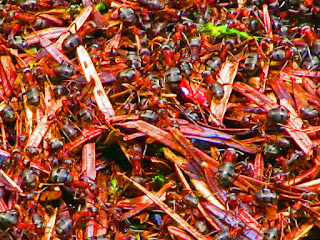In December 2017 I started to collect information about open source game projects with the goal to build them and finally improve some of them. I thought about a one year project and maybe 200 games I would look at.
Now, over three years later, the open source games list (OSGL) contains information of ~1300 games and thousands of developers and I hardly started building and improving the games. But I can already say that I will be able to only work on a few of them, a tiny minority of all projects, which are out there. And it will take years, if not a decade. And lots of new projects will be started in the mean time.
Reflecting on this gave me the following (maybe familiar) feelings
- We are so small!
- The world is so big!
- And so complex!
- Only by working together we can actually achieve something significant!
- We are like ants!
- Organization is everything!
- It's so humbling!
- It's not the individual, it's all team work!
 |
| Ant nest - Taken from Andrew Gustar on Flickr (licensed CC BY-ND) |
I will continue to plow that field, but with a renewed sense of what it means to work together and what can be achieved really (need to prioritize even more). One thing becomes clear however: Organizing ourselves is the key to make use of us most efficiently. Open source game developers should strive to even better connect themselves.
